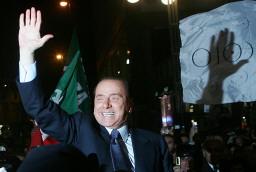Flamboyant media magnate Silvio Berlusconi won a third term as Italy's premier on Monday, emerging from the country's two-day general election with a stronger-than-expected mandate to govern.
Centre-left challenger Walter Veltroni conceded defeat in a phone call to 71-year-old Berlusconi after projections based on vote results showed the centre-right chief had gained a solid majority in both the House and the Senate.
Berlusconi subsequently said ''this is a great responsibility. I will govern for five years but difficult months are ahead which will require extraordinary effort''.
Speaking in a telephone link-up with TV talk show Porta a Porta on state broadcaster RAI, Berlusconi said he had always been certain of victory.
''I always knew it from the opinion polls which confirmed these figures,'' he said.
The projections showed Berlusconi's alliance winning in the House by 45.9% to Veltroni's 39.1%.
They saw 340 seats in the 630-member House going to Berlusconi's side and 241 to Veltroni's.
Berlusconi was also seen achieving a clear victory in the 315-strong Senate, where seats are assigned on a regional basis and where exit polls had initially indicated a close enough race to raise the spectre of a hung parliament.
Instead, projections saw Berlusconi's alliance clinching 162 seats to Veltroni's 142 after gaining 46.8% of the vote compared to the former Rome mayor's 38.4%.
Turnout in the vote, which ended at 15:00, was just over 80%. While the figure was high, it was 3.5% down on that posted in the previous, 2006 election won by outgoing centre-left Premier Romano Prodi.
Berlusconi spokesman Paolo Bonaiuti said the election outcome represented a ''clear and decisive turnaround'' for Italy and would provide the country, which has seen more than 60 postwar administrations, with a ''stable government''.
Berlusconi made history last time round by becoming the only premier since the end of the war to last a full five-year term.
ECONOMIC DOLDRUMS AND LOW MORALE.
Berlusconi has promised to pull Italy out of the economic doldrums with tax and public spending cuts and more infrastructure investment while improving the lot of the poorest workers and pensioners.
Political observers said a strong Senate majority would help him to push through much-needed reforms.
Italy is teetering on the brink of recession, with GDP growth put at only 0.3% this year by the International Monetary Fund.
Strapped by the third biggest debt mountain in the world, the country is lagging behind its euro-zone partners.
Consumer spending has fallen as Italians struggle with some of the lowest wages in Europe and a hike in inflation which has included food prices.
The near-bankruptcy of Italian flag carrier Alitalia, an ongoing trash crisis in Naples and a scare over dioxin-tainted mozzarella have also knocked morale.
Even the ever-optimistic Berlusconi has had to admit that tough times are ahead.
His election manifesto states that ''we do not carry out or promise miracles'' and warns that Italy is in the midst of an economic crisis which could get worse.
Berlusconi has portrayed himself as the only politician with the sufficient experience and popular support to steer Italy through difficult times.
But critics point out that Berlusconi failed to deliver on his promises during his 2001-2006 government when he also enjoyed a solid majority.
His economy minister will once again be Giulio Tremonti. During Tremonti's previous term in obvious, Italy's public accounts declined sharply.
Berlusconi, who owns the three-channel private TV network Mediaset, is also expected to come under renewed fire over the conflict between his vast business interests and political powers.
The PDL leader is also still beset by legal woes and is currently a defendant in two corruption trials in Milan.
He denies wrongdoing, claiming that left-leaning magistrates are persecuting him for political reasons.
LEFT OUT OF THE PICTURE.
The election yielded another surprise with the disastrous performance of the Left-Rainbow (SA), a federation of hard-left parties and Greens led by premier hopeful Fausto Bertinotti. The SA faced being kicked out of parliament all together after it failed to pass the thresholds needed for representation in either the Senate or the House.
It would be the first time that Communist deputies would be absent from Italy's postwar parliament.
Veltroni deliberately avoided a coalition with other forces, particularly the hard left, arguing that a multi-party alliance would weaken his Democratic Party (PD) by exposing it to the potentially conflicting demands of its partners and the chronic instability that afflicted Prodi's outgoing government.
Ironically for a system of proportional representation, the election appeared to have eliminated from the scene most of the small parties criticised for creating instability and wielding power that was disproportionate to their size.
Among the movements which failed to gain representation was The Right, a new party led by Francesco Storace which had hoped to win substantial votes from the National Alliance (AN) after the latter's decision to merge into Berlusconi's People of Freedom party (PDL).
The once-mighty Socialist wing will also disappear from the scene after the failure of Socialist Party leader Enrico Boselli to win enough votes.
According to the latest projections, only six parties will take up seats in the House this time round: the PDL; the PD; the Northern League, a populist, devolutionist party which is allied to Berlusconi; the tiny Sicilian-based party, Movement for Autonomy (MpA) which is also allied to Berlusconi; Veltroni ally Italy of Values (IDV) led by former anti-graft prosecutor Antonio Di Pietro; and the centrist, Catholic UDC, a former Berlusconi ally.













